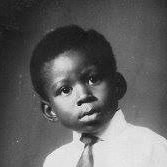‘To keep Nigeria one is a task that MUST be done!’ I still remember this ubiquitous radio PSA issued by the Military authorities during the turbulence of the civil war between 1966 to January 1970. This and a handful of memorable jingles are etched in the subconscious minds of a generation of Lagosians physically removed from the ravages of war, but still connected by war propaganda issuing forth from their radios. Ironically, fifty years on and against the backdrop of fears of national disintegration, separatist and irredentist fissures forcibly asserting themselves through the whitewash of national unity, Nigeria is yet again at the cliff’s edge peering into the abyss of a dark roiling quicksand of manifold existential threats. Now the message, without the Military imperative verb of MUST… must now consider other verbs. To keep Nigeria one is a task that SHOULD be done? To keep Nigeria one is a task that CAN be done? Or… do we continue to trundle along DIVIDED WE STAND? Enjoy
Imagine if you will, the area is known as Nigeria ceasing to have any geopolitical significance. I mean Nigeria, simply as ‘Niger-area.’
Along with this divestiture would go a catalogue of superlatives. Africa’s most populous nation. One of the richest nations in ‘Black Africa’. The fourth-largest democracy in the world. Her operative capital, Lagos, would cease to be one of the most populous metropolises in Africa. It would also cease to be the dirtiest and most expensive capital in the world.
Nigeria’s sprawling 923,768 square kilometres would be fragmented into over two hundred and fifty distinct ethnic boundaries. It would be a regression to pre-colonial times, to epochs when there were distinctly separate, and indeed, great, nations. Up north was the Kanem-Borno Empire, strategically located around the great Lake Chad.
To its west, the older seven Hausa states of Biramo, Daura, Gobir, Kano, Katsina, Rano, and Zazau. Moving down south-west and across Nigeria were the Yoruba kingdoms (notably, Oyo) but all claiming the single ancestry of Oduduwa, with Ile-Ife regarded as their spiritual capital.
To the east was the ancient Benin Empire that encompassed Ekiti, Owo, Ondo and Eko as tributary states. In the middle-belt areas, Igala, Jukun, Borgu, and Nupe also evolved into large independent kingdoms.
And along the eastern and middle areas of Nigeria, peopled by the Ijaws, the Tivs, the Ibibios, the populous Igbos evolved into large autonomous village communities that were governed through a unique system of elders and family heads.
The earliest external influence to reach the area presently called Nigeria came through the Islamic faith around the ninth century. Around that time, the Islamic faith and ideas began to filter from North Africa, first into Kanem-Borno, and then into other parts of the northern region. And until 1803, when
Usman Dan Fodio launched his jihad; the religion was limited to a small elite. The second and more relevant wave of eternal influence, came around the fifteenth century, with European ships loaded with traders and their wares visiting the Nigerian coastline settlements of Brass, New Calabar (Kalabari), Lagos, Bonny, and Old Calabar.
And along with increased trade came the obnoxious trafficking in human beings. Africans were, of course, the merchandise. Without wanting to dwell on the morality (or immorality) of the slave trade, we move to 1883, exactly one hundred and fifty years ago, when an English liberal (and leader of the abolitionist movement) by the name of William Wilberforce managed to convince the world to abolish the slave trade.
The trade-in human traffic stopped, alternatives had to be sought. And the post-abolitionist era saw a tremendous surge in both the exploration and exploitation of Nigerian resources, under the euphemism of ‘legitimate commerce’. Along with legitimate commerce came colonialism through the pulpit. By 1849, colonialism, Christianity, and ‘legitimate commerce’ had come to stay. John Beecroft was appointed Governor of the Bights of Benin and Bonny, with the task of regulating trade in these areas. In 1861, after putting down some insurrections, Lagos became a crown colony.
Meanwhile up north, an amalgamation of British firms, formed by George Goldie, had taken control over a large portion of the north, following the decline of Usman Dan Fodio’s jihad. The company was known as the United Africa Company (UAC). And by 1855, it had received a royal charter to govern the territory, now named the Protectorate of Northern Nigeria.
Down south, the Delta areas had been proclaimed the Oil Rivers Protectorate; by 1893, following territorial expansions inland, the name was changed to the Niger Coast Protectorate. In 1906, the Lagos colony was merged with this territory to form the Colony and Protectorate of Southern Nigeria.
Finally, in 1914, under the auspices of Lord Lugard, the two British territories were fused into a single territorial unit known as Nigeria.
And since then, it has been a titanic struggle to preserve that unified identity. Independence has been won, coups have been staged, wars have been fought, and countless lives lost in the pursuit of nation-hood.
Nigeria is like a centrifuge, with minute and sometimes disparate particles swirling at break-neck revolutions. There is the centrifugal pull (away from the centre, towards disintegration) of our most inveterate ethnic sentiments. And the centripetal force (towards the centre, and towards unity) of a paucity of genuine patriots, and a legion of dubious nationalists.
It is to the latter that I say that the question of Nigerian unity, peace, and stability should be qualified. It is not enough to want and aspire to achieve the hackneyed ideals of unity, peace and stability, without asking ourselves what we intend to do with them once obtained. Unity, in our own context, is meaningful only when it is utilitarian in design and execution.
What we have presently are pseudo-nationalists disguised as politicians, who ostensibly claim to want to foster brotherhood and national unity. But the truth is many want Nigeria, compacted as Nigeria, only so that they and their tribes can benefit selfishly from the bounties of a ‘One Nigeria’.
The older generation of politicians are guilty of purveying tribalism insidiously, so that they can strengthen their respective ethnic base. All the political parties (no matter what any of them might claim) when closely scrutinised, are structured along glaring ethnic lines. This chauvinism is faithfully duplicated in all facets of national life.
And so, we might want to ask ourselves where and how we stand … united, or divided? United as a truly unified Nigeria, we obviously stand to benefit more, in terms of development, and based on our stature in the dynamics of global geo-politics.
But the raucous cries for more states, if anything, is proof of a powerful undercurrent of fragmentation, if not disintegration. The creation of more states (twenty nine, at last count) might, in the short-run, allay the real or imagined fears of domination of the minority groups by the larger three groups, but would only create more problems than it solves.
The idea of a confederation emasculating the centre and granting greater autonomy to the regions is an attractive option. But the great fear is that lacking a proclivity for a unanimous centre, we might fragment into scores of ‘Banana Republics’.
What we really need is a purposeful decisive and detribalised leadership that would act wholly for Nigeria and for Nigerians.
Unity is meaningless if it is not utilitarian.
The Punch,
Saturday, July 23, 1983



